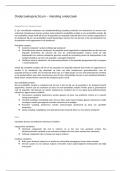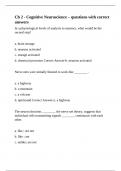LETURE 1: INTRODUCTION + SELF-DISCLOSURE
Today: 2 theories about disclosing personal information in social relationships
- Social penetration theory
- Communication privacy management theory
WHAT IS THIS COURSE ABOUT?
- Interplay between different media types and language use
o Affordances of a medium determine possibilities for communication
- Ways in which language is used in
o Building and maintaining relationships
o Public communication
- Course builds on Introduction to Communication Studies (Period 1)
o If you did not take ICS: Read Chapters 1-4 of the handbook A First Look at
Communication Theory for some background information
FORMS OF TUITON
- All classes are on campus, there are no online alternatives
- All lectures are on Mondays and Fridays (13.30-15.00) in NU-4C5
- Seminars are on Fridays (mandatory attendance)
- English seminar: 9.00-10.30 in NU-4B47
ASSESSMENT
- Weekly group assignments (30%)
o To be submitted each Monday (in Weeks 2-7) by 12pm
- Multiple choice quizzes during seminars
o Practice for the final exam
- Multiple choice exam in Week 8 (70%)
o Based on all lectures, seminars, and required readings
TO PASS THIS COURSE
- Attend all six seminars (otherwise you won’t be eligible to take the exam)
o If you are going to miss a seminar, you need to let your tutor know in advance
- Score 5.5 (out of 10) or higher on the weekly group assignments
- Score 5.5 (out of 10) or higher in the written exam
- Achieve a final score (i.e., weekly group assignments + written exam) of 5.5 (out of 10) or
higher
1
,REQUIRED READINGS
Griffin, Emory A., Ledbetter, Andrew, & Sparks, Glenn G. (2014). A First Look at Communication
Theory (Conversations with Communication Theorists). 10th edition. McGraw Hill Education.
!!! Check out the companion website: www.afirstlook.com
→ extra knowledge, practice questions, etc.
Several extra research articles (see Canvas)
WHAT IS EXPECTED FROM THE STUDENT?
To answer: go to menti.com & code use code: 6093 1964
- Attend lectures & seminars and participate in discussions & activities
- Ask questions whenever something is unclear (it’s okay to interrupt the lecturer!)
- Come to class prepared and keep up with the weekly readings
- Check your email and Canvas daily
- Be a reliable and helpful team member
- Submit group assignments on time
- Be collegiate & kind when you interact with your peers
WHAT CAN BE EXPECTED FROM THE LECTURERS
- Be enthusiastic and knowledgeable about the taught topics
- Post lecture and seminar slides on Canvas
- Reply to your emails within 48 hours on workdays. Preferred modes of communication:
Canvas messaging
- Provide feedback in class and on assignments
- Listen to and act on students’ feedback about the course
- Advise you on how to study effectively & how do well in this course
SEMINARS AND GROUP WORK
- You are allowed to be absent once, but you need to email your seminar tutor in advance and
to provide a legitimate reason for missing the session
- When you miss a seminar, get in touch with a colleague to find out what you missed
- Bring an electronic device (laptop, tablet, smartphone)
- Group work
o 4-6 members (cannot be changed after week 1)
o New assignments each seminar, on which students work individually and then in
groups
o Form a group before Friday (sign up via Canvas -> People tab -> Groups (make sure to
use the correct English/Dutch seminar!)
2
,SOCIAL PENETRATION THEORY
How do people develop close social relationships?
Think about your best friend(s) → how did you become friends?
- Social Penetration Theory explains how relational closeness develops through self-disclosure
o Gradual & voluntary sharing of increasingly personal information: preferences,
attitudes, feelings, values, secrets etc.
- People are like onions: their personality has a multi-layered structure
THE ONION MODEL
- Outer layer: public self
- Beneath the surface: attitudes, likes, dislikes, personal history
- Inner core: self-concept, values, secrets, unresolved conflicts, trauma
→ The layers of the onion get tougher closer to the centre
- Depth of penetration: degree of personal disclosure in a specific area
- Breadth of penetration: range/variety of areas that are shared
E.g., you meet someone at your hobby (sports or a music instrument), and you develop a
friendship based on that aspect you have in common. The self-disclosure with this person
might get deep but you don’t get to know each other in other aspects of life so it is very small
in breadth
E.g., summer romance is going in depth but not in breadth because you get intimate very
quickly, but you don’t cover a lot of aspects of your life
3
, THE PROCESS OF SELF-DISCLOSURE
1. Shallow information is exchanged more frequently and sooner than private information.
2. Self-disclosure is reciprocal.
o Law of reciprocity = a paced and orderly process in which openness in one person
leads to openness in the other
3. Penetration is rapid at the start but slows down when inner layers are reached.
o People keep their traumas and hurtful situations from their past close and do not tell
them easily
o Societal norms against telling too much too fast
4. Depenetration is a gradual process of layer-by-layer withdrawal.
o Relational retreat is a sort of taking back of what has already been exchanged in the
building of a relationship.
o It is rare that this happens very sudden
REGULATING RELATIONAL CLOSENESS
The process of social penetration will proceed if for both parties the perceived benefits outweigh the
costs of the interaction
- Social exchange theory (John Thibault & Harold Kelley)
Social exchange: Relationship behaviour and status is regulated by both parties’ evaluations of
perceived rewards and costs of interaction with each other.
Three concepts related to social exchange applied to social penetration
1. Relational outcome
2. Relational satisfaction
3. Relational stability
1. Relational outcome:
People try to predict the outcome of an interaction before it takes place
Outcome: perceived rewards minus the costs of interpersonal interaction
People try to predict the relational outcome of an interaction before it takes place
Minimax principle of human behaviour: people seek to maximize rewards and minimize costs
→ The higher we rate a relational outcome, the more attractive we find the behaviour that might
make it happen.
E.g., the friendship between Harry and Hermione, she’s very kind and smart and hard-working
(benefits) but she is also a know-it-all (drawbacks)
4












